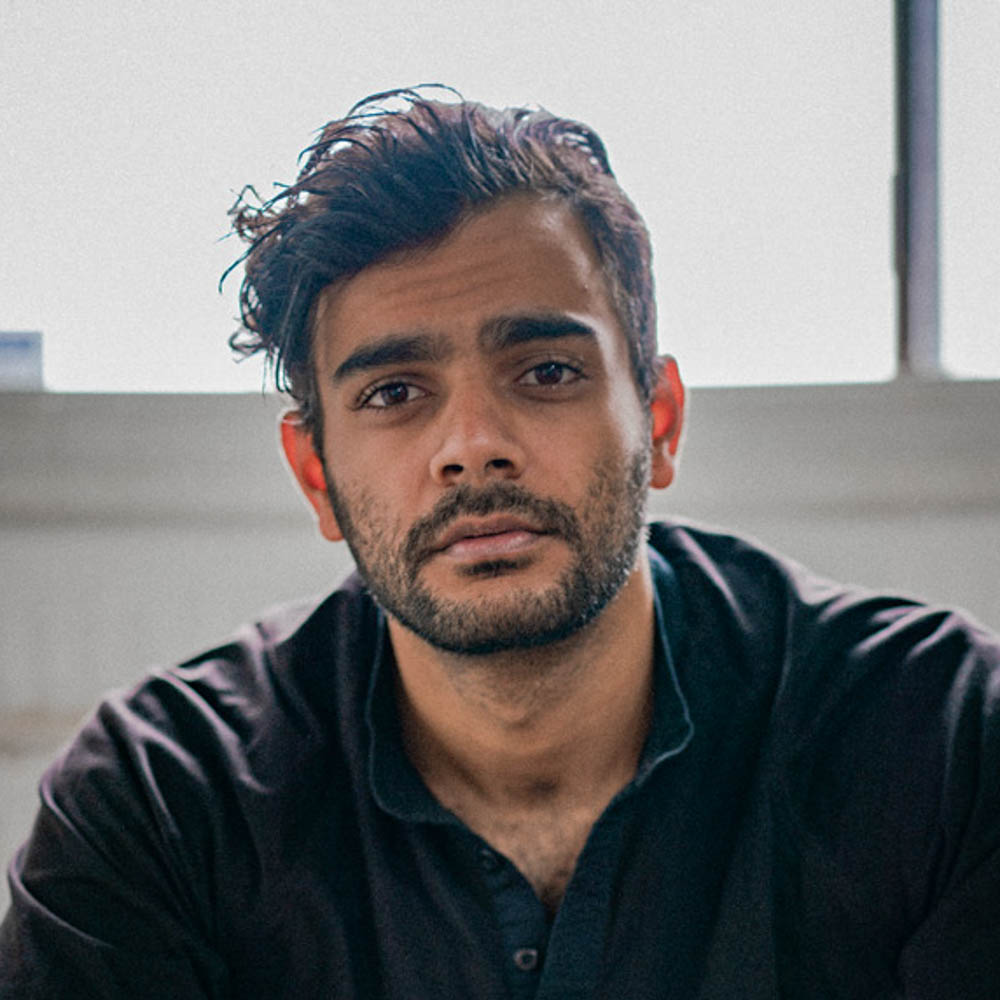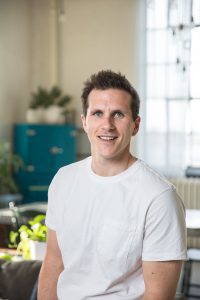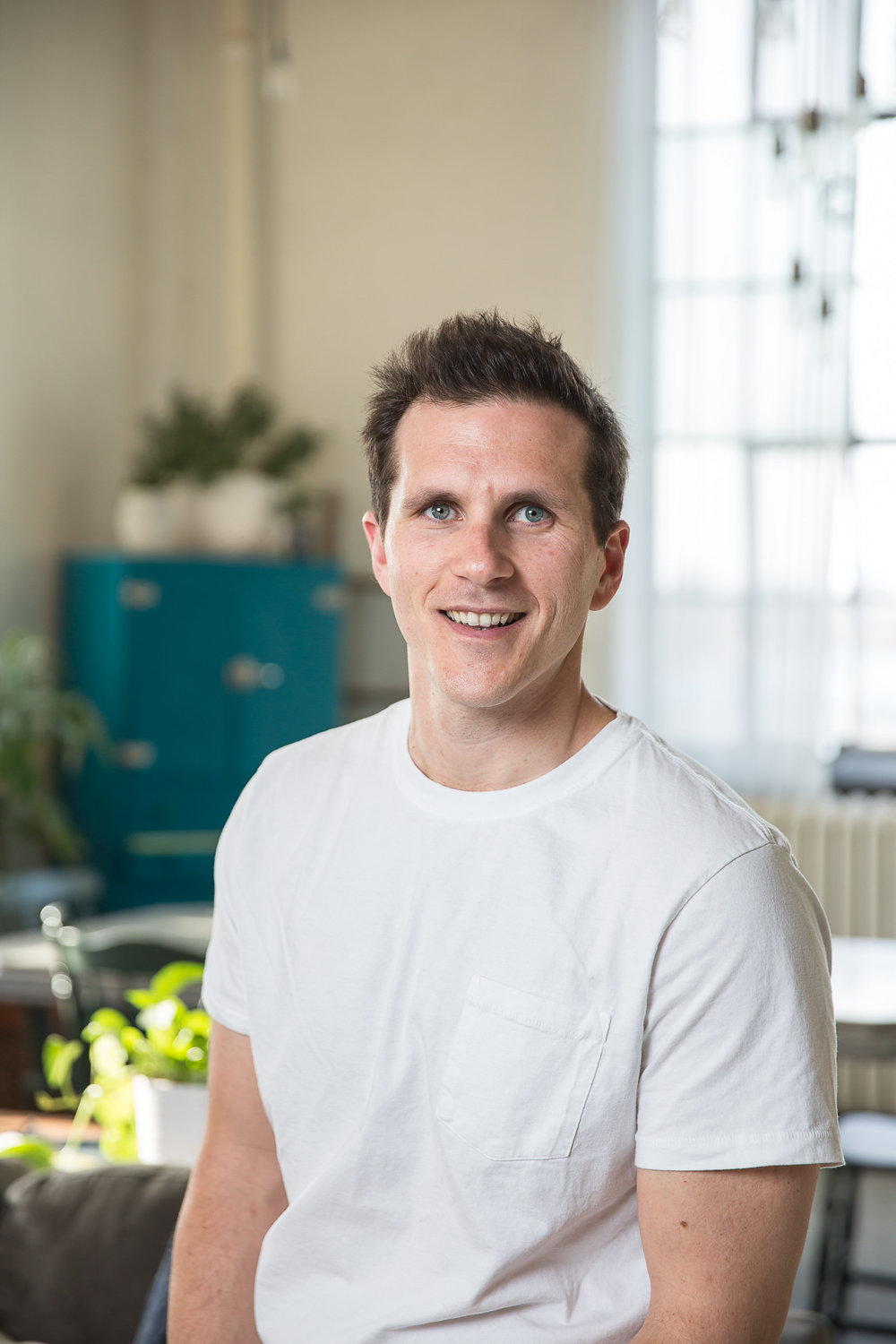[vc_row][vc_column][vc_column_text]You’ve seen Hamza Haq on your television, playing Dr. Bashir Hamed on CTV’s Transplant. If you’re lucky, you’ve seen this clip of Haq in a pig costume, from his days working in children’s television. Next week, you’ll get to see Haq in his most vulnerable role yet: himself.
Haq is one of the speakers for this year’s upcoming TEDXToronto digital event series. The independently organized TED event has gone digital due to current circumstances, but no matter its platform, TEDxToronto promises to deliver the same thought-provoking and community-building experience.
The theme for the digital event series is ‘Uncharted’; and the first of four nightly events is on Oct. 29, 2020. Haq will be one of five main speakers for the evening.
On Transplant, Haq plays the character Dr. Bashir Hamed, a Syrian doctor who has fled to Canada in search of a new life. Like his character, Haq is both a Muslim and an immigrant. At the age of nine, he moved from Pakistan to Canada via Saudi Arabia with his parents. As an actor, Hamza is passionate about bringing stories to life that uplift real voices, including refugees and immigrants.
As his first major role in an acting production, Haq has overcome some learning curves—like working almost everyday for eight months—but the outcome has been well worth the effort. In addition to online fans expressing their gratitude for representation, Haq has seen some first hand effects on showing the reality of refugees throughout the world through artistry.
Before Haq takes to the (computer) screens for TEDxToronto, Bay Street Bull sat down with him to find out more about the ‘Uncharted’ parts of Hamza Haq. We couldn’t find out any spoilers about his TED Talk, but we did find out his favourite part about Toronto. [/vc_column_text][vc_text_separator title=”Q&A” color=”custom” border_width=”3″ accent_color=”#1b78c4″][vc_column_text]I read that you studied film in school and that you were in quite a few other acting projects growing up, so you had some experience. What your biggest learning curve was when you got the lead role in Transplant?
Honestly, I never gave enough attention to or gave enough credit to how difficult the job really is.
My experience with acting thus far—playing parts here and there—was slowly rising. But to be a lead character for months at a time and we had an eight month production schedule? I did not give enough credit to artists who come in day in, day out, for as long as they do, and the physical and emotional toll that it takes.
I learned that this is a stamina game—that was a major realization. You go all in four months and then you realize you’re only halfway there and you’ve got to keep going and staying at that emotional range. And for actors who have had these 30, 40 year long careers, they’re churning out amazing projects year in and year out. That’s a remarkable feat. And it’s just something that I grossly underestimated. So I would say that for sure.
Definitely a great lesson. Until you’re doing a job, you never really realize all of the inner workings of it. So, I feel like that’s something that a lot of people experience in any industry.
It was field experience, you sort of learn on the job. This is the largest scale project that I’ve been in, with respect to how involved I’ve been in it as well. I’ve been in big budget movies, but I was there for a day as opposed to this [Transplant]. It was just spectacular.
And I think I had, I don’t know, probably 11 days off during the entire production schedule. So, it was a little bit different, but it definitely solidified that I love what I do.
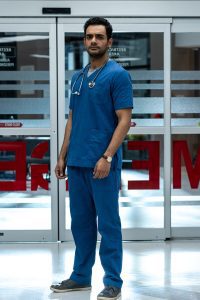

I’ve also seen you say that playing a successful Muslim immigrant character as someone who is Muslim and an immigrant yourself makes you very proud. Do you have any favourite memories of other people who watch the show telling you what your character means to them.
Friends, family, everybody. There’s a great deal of people who resonate with the character in this story, and I’m very happy to hear that. But for me, it’s usually just random people either on Twitter, Instagram—doctors or other people or just refugees or immigrants—that say that they feel seen or heard for the first time.
And I would have to say for me, the biggest validation or anything that I’ve gotten throughout this would be actually two instances. There’s a gentleman who is on our show, his name is Elie Shankji. And he plays one of the characters in Transplant, Saleh, who’s a white helmet back in Syria. And Elie himself is from Syria. He was an up and coming actor over there when the war started, and he was displaced. When we got to be on the show together, he was quite happy that the show was being made. When he saw the amount of effort that I was putting into telling the story and the way the script was written, he was very happy with what we were doing.
Also, on opening night, we had about 70 people from the Syrian Canadian Foundation come out and check out the show. Two of whom had just arrived from Syria weeks prior to that. And I believe one of them was a dental hygienist, and she is currently in the midst of trying to get re-accredited so she can work again. So, you know, for somebody who just got here too far to see a representation of something that she is going through immediately and to sort of get a little tip of the hat from that community, that meant a lot.
That’s fantastic. And I know you talked about the stamina that goes into filming a season before it even gets to TV, but what are you looking forward to with getting back into the studio and filming season two?
Just doing it again.
We’ve been on ice—like much of the industry—for a little bit over a year now. We wrapped filming in mid-December, so 10 months of waiting around to see what’s going on. And I mean, we were renewed four months after, so we’ve just sort of been waiting for the go ahead. So honestly, just getting to work with everybody again.
In the film industry, we’re all used to ‘bubbles’ and sort of spend six, seven months with these people. You essentially live a whole life together and you’re not really allowed to talk about what happens. So there’s this there’s this beautiful family sort of spirit that gets built around that.
So, I’m just really looking forward to being with everybody again and sharing that space. We all worked very hard and made what I believe to be a beautiful story. To get the opportunity to continue to do that with people who care about it and who care about you, there’s nothing like it. Whenever day one is, I’m just looking forward to getting back together.
We’ve recently seen how successful Canadian TV shows can be with Schitt’s Creek at the Emmys.
Yeah, absolutely. Congrats to Schitt’s Creek, that was phenomenal!
Do you have a favourite part about being a part of the show that’s so inherently Canadian.
You know, I don’t believe Transplant to be an inherently Canadian show. I think the fact that it leans into the fact that these are very real situations that are going on in Canada, that’s great. And I love the fact that we’re not shying away from the fact that we’re representing Toronto.
However, I really think it’s a show that’s based on reality, that happens to take place in Canada. The universality of that is what I think speaks to its success internationally, really. So although it is very Canadian—it’s Canadian made, it stars a lot of Canadians, our patients don’t have to worry about hospital bills and everything like that—I really feel like we have a great opportunity to to just speak to the universality of this experience because there’s refugees all over the world and that I think, is very relatable.
So, where I feel proud about telling this story is that Canada is taking the steps to talk about what’s going on in the world. And that, I hope, is reflective of the Canadian spirit: that we’re taking the risks necessary to talk about things that are bigger than us.
And also Canadian related, you’re speaking at TEDxToronto coming up. How did you get involved with that?
By the grace of God and good luck [laughs], someone recommended me for it. One of the main organizers of TEDxToronto, actually went to high school with a supervising producer of Transplant. So they were just talking about putting people together and our supervising producer recommended me for it. Then we had a conversation like, “Do you think this is something you’d be interested in?” and me with my imposter syndrome was like “I don’t know, man.”
We ended up having a couple of conversations and based on those very open ended, open forum style exchanges, he was just like, “These are recurring themes that you keep on addressing. So is this something you’d be interested to talk about?” And based on that, we’ve built a speech with myself talking about something that I’m passionate about. All of the various TEDxToronto coaches have been guiding me so generously with their time and their patience with my lack of understanding with this whole process. So, it’s been beautiful and very unexpected, but I’m excited.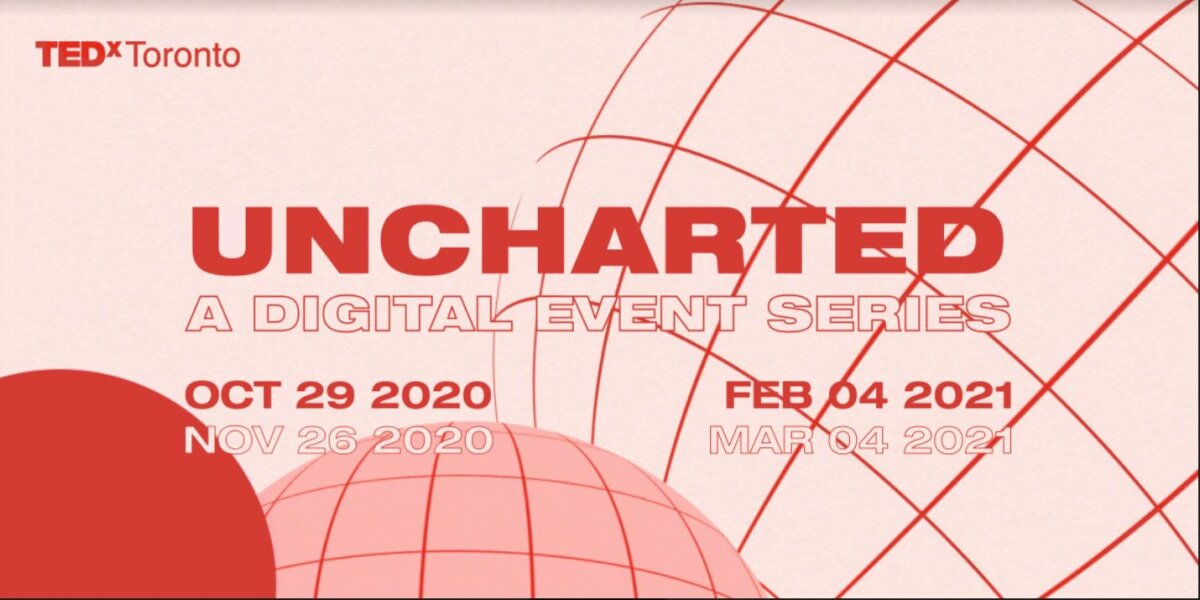

The TEDxToronto theme is ‘Uncharted’ this year. What does that mean to you?
It’s funny, the TEDx marketing people asked me this question too. My immediate answer was just like “You guys ever play the Uncharted Game series by Naughty Dog on PlayStation?” [laughs]
To me, it just means discovery. Places that I haven’t explored in myself and I’m using this talk to be candid about a lot of things that have shaped my experience and things that I haven’t really talked about publicly. I’m hoping to see that if there’s other people who can relate to that. Because, you know, the great thing about discovery is you get to share it with other people.
Hopefully if I strike someplace that someone else hasn’t looked, it’ll encourage them to look in those places as well and I’m happy to go there.
That’s awesome. And with a new digital format, now there’s really no limits on who can attend—which can be nerve wracking. What is the difference for you between the preparation of filming a scene and getting it right, versus preparing a very personal speech. What has that process been like for you? And what would you say one is harder than the other?
I can’t really say which ones which one’s easier or harder. The only difference is that I’m the one writing it and I have to bring myself to it from the source. Whereas in the method of acting that I’ve pursued, and based on my training, I have to bring the truth of myself to what is written already [when acting]. So, to try to create that aspect of it—that aspect of truth—it’s equally vulnerable. You know, there’s aspects of Bashir or any character that I play that is written that I have to bring an honesty and a vulnerability to.
And I would actually say it’s kind of easier to just write because I don’t have the act that. I don’t have to look for inspiration or try to relate like, “How does this relate to me?” and “How does this apply to my life?” which is more how I approach acting, where I have to bring myself to the character.
But over here [with TEDxToronto], it’s kind of just me. To get the opportunity to be authentically yourself, that’s a once in a lifetime thing and an incredibly generous thing that I don’t think a lot of people get the opportunity to do.
So the fact that I’ve been afforded that is just it’s just kind of cool. It’s why I do what I do. And I’m glad that I’m getting the opportunity to do that.
It’s a chance to show the world who you want to present, in your truest form. So that’s something that’s probably very exciting.
Yeah. I mean, especially with all this PR stuff, you get boxed into this idea of what people think you are, who people think you are and everything.
So to sort of, not do that and just kind of shoot from the hip and be honest about certain things, I think it’s a great opportunity to get it early on before there’s too much hype around who I am. So I can be like, “Temper your expectations, people. I’m just a dude, okay?”
When people expect things of you as a Muslim person or as a minority, there’s that added pressure that you have to be everything for everyone. I’m just trying to be myself for myself right now and hoping that I can do good with that.
Obviously, TED Talks are huge, but with TEDxToronto, it’s a little more intimate, very community based. Although the show is shot in Montreal, Transplant is based in Toronto, do you have any favourite things about the city?
Yeah, I do love Toronto.
I don’t know if I could live there—I mean, I did for a couple of years— but, Toronto is like our New York. It’s kind of chaotic, it’s the feeling of “Man why am I here?” but you can’t leave either.
You show up and you feel great, and then you feel like you don’t fit in and you also feel like you’re working too hard, but then you wake up in the morning ready to do it all over again.
It is just full of culture and diversity. Toronto’s a place where I found other brown Muslim artists unlike any other city that I’ve been in. So that was really great to just be able to see like-minded people who share your experience to some degree.
I initially went to Toronto for the challenge to be just like, “Well, you know, let’s let’s give it a go.” And I’ve said this in two interviews before, but I kind of like my answer so and I’m going to reuse it: Toronto was the place where I got my ass kicked, but, you know, sometimes it takes an ass kicking to know that you can take an ass kicking and keep going. And that’s something I’ll forever be grateful to Toronto for.
I’ll go [to Toronto] often to be humbled by what challenges that this country has to offer. Toronto is a challenging city, but it demands the absolute best of you and it pulls it out of you. You either rise to the challenge or it’ll swallow you whole. And hopefully people can relate to the former.
Since we’re talking about TED Talks, do you had a favourite TED Talk that you’ve watched and gone back to? Or if not, is there any sort of inspirational quote or story that has kind of inspired you to keep following your mission and going ahead?
I listen to a great amount of podcasts with actors and actresses, so that’s usually what I rely on. But where I became familiar with the concept of TED talks in general—and it was always circulating in WhatsApp group chats like “Guys like check this out!”— is the Brene Brown TED Talk on vulnerability and how that’s really your your weapon.
And that’s how I relate to my acting. When you own your own vulnerability and when you admit it and you have the courage to be vulnerable, you’re going to be the best version of yourself. I might be paraphrasing incorrectly, but that video is something that I’ve watched in passing a couple of times—maybe not as diligently as maybe I should have— but that’s definitely something that always comes around and I think about.[/vc_column_text][vc_separator color=”custom” border_width=”2″ accent_color=”#1b78c4″][vc_column_text]
Tune in to Hamza Haq’s TEDxToronto talk on Oct. 29, 2020. Get a season pass to attend all four of TEDxToronto’s ‘Uncharted’ speaker series for $40, or attend a single session for $15.
[/vc_column_text][/vc_column][/vc_row]


